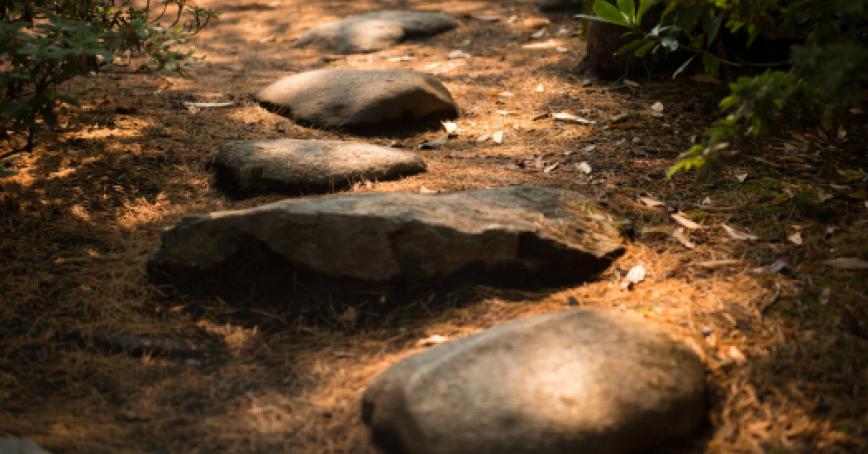Nature is for healing

An ancient cedar invites visitors into its shade to breathe and be. Forest trails summon hikers to wander and wonder. Esquimalt Lagoon beckons, too, the lapping of saltwater on its shores whispering as the Olympic Mountains loom massively, silently in the distance.
And from each of these murmurings, the message is the same: Nature is for healing.
The grounds and gardens of Victoria’s Royal Roads University are legendary — in fact, they’re a National Historic Site — and beloved by students and staff who revel in the beautiful backdrop to education. But those acres upon forested acres are also a free and accessible backyard to Vancouver Island residents and other visitors, a lush landscape alive both with flora and fauna and the well-documented mental health benefits of time spent away from screens and amongst greens.
“There’s different levels of connection… There’s great, rich instruction to be found in the dark, reflective surfaces of the world, in the bedazzling beauty and the wild spontaneities,” says Dr. Hilary Leighton, an eco-psychotherapist and registered clinical counsellor in private practice as well as an associate professor and program head in Royal Roads’ School of Environment and Sustainability.
“There’s something that happens to most people who have come to Royal Roads… It’s a love of a place but it’s also some sort of deep resonance that happens that keeps people coming back.”
That applies not just to students but to visitors from the larger Vancouver Island community as well.
“I don’t think we can grasp the university without concerning ourselves with the gardens and the forests and the land… or the community,” Leighton says. “It’s all tied and tethered. It’s all part of this intricate relationship.”
RRU is aiming to enhance that relationship with A Vision in Bloom, a fundraising campaign launched this spring to restore and revitalize the university’s historic gardens, expand the existing apiary and build a thriving organic food garden. As part of this, it has started a Commemorative Giving program to enable the installation of six new legacy benches across the campus, with money raised going to enhance park infrastructure.
That park landscape is all about connection, says Paul Allison, supervisor of gardens and grounds at Royal Roads.
“Nature is not something outside of us,” he says. “We are nature.”
Allison notes: “When people go into the landscape — and this is something I’ve studied for the last 40 years — what happens is people actually chemically change. Anxiety levels go down, the amount of cortisol in your body goes down, which is your stress hormone.
“It’s kind of like the body’s natural high.”
Allison has seen it in action, in health care and education. A professional gardener for half a century, he has designed landscapes on three continents, and at Royal Roads, he works with Master of Business Administration students, noting the word “business” has its origins in anxiety and “busyness,” and talks to them about self-care, and mind and body wellness.
He also witnesses how they and visitors interact in nature on the university lands and says the feelings and images of those interactions stay with them.
“They remember the water wheel turning. They remember the beauty of the landscape. They remember the solitude and the quietness. It’s memories. It’s how they felt, how they feel.”
Allison calls Royal Roads’ landscape “one of the world’s greatest gardens” and says one of his favourite spots at the university is on the shoreline, gazing out at the point where ocean meets sky.
Asked about her special spots on campus, Leighton says, “There are so many secret living laboratories, so many wonderful spaces,” but settles on one favourite: It’s an old and massive cedar on which Royal Roads’ iconic peacocks often scratch themselves, dropping their iridescent “eye” tail feathers; climbing under its low-laying branches, there’s enough space for a class, she says.
“Royal Roads has its own sort of magic,” Leighton says. “It’s got a beautiful quietude to it.
“There’s always something blooming or blossoming or happening, and yet, it’s this incredibly calm and tranquil space.”
Join us to restore garden heritage, build food production or celebrate a friend or loved one in your life.